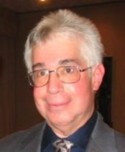|
The golden age of film music lasted, arguably, from approximately 1932 until 1966, during which most of the classic film scores were composed and recorded. Perhaps the greatest practitioners of that noble art form were Bernard Herrmann and Miklos Rozsa.
While Rozsa was, for the most part, even-tempered, cultured and essentially gentle in his outward demeanor, Bernard Herrmann was a conflicted personality, a soul in torment. Sensitive and introspective in one moment, and given to unreasoning rage in the next, Bernard Herrmann remains the most explosively colorful of Hollywood’s classical composers. Herrmann was wary of people, strident in his efforts to resist betrayal from without.
Bernard Herrmann
| Suspicious, cynical, and often belligerent toward those he deemed artistically challenged or deficient, Herrmann’s outward anger belied a deep sensitivity he tried desperately to conceal, as though the revelation might somehow render him weakened, and vulnerable to attack and criticism. Yet, despite his public bluster, Herrmann’s music betrayed his facade more effectively than any rival or critic could ever have done. One has only to listen to the grand romanticism he exhibits in such scores as The Ghost and Mrs. Muir, Vertigo, and Fahrenheit 451 in order to see clearly the basic sweetness, and eloquent innocence at the soul of his Jekyll and Hyde persona.
Herrmann has justifiably been compared to Richard Wagner and Claude Debussy in the beauty and delicate weave of his melodic passion and tapestry. |
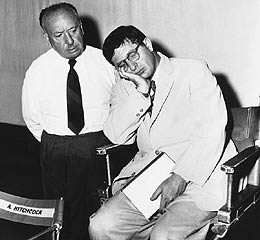
Alfred Hitchcock and Bernard Herrmann |
Nowhere is this tenderness more evident than in the gentle rhapsodies of The Ghost and Mrs. Muir, Vertigo, and Fahrenheit 451. Herrmann never believed in, or resorted to compromise. He wrote for the screen, either large or small, with the same integrity and devotion he gave to the concert stage. Indeed, one of his most remarkable scores was written for the television production of Rod Serling’s “Walking Distance” on The Twilight Zone.
"Walking Distance"
Like Herrmann himself, the character of Martin Sloan (Gig Young) is an embittered, harried advertising executive, tired of betrayal, fearful of change, imprisoned in a cell fashioned by economics and political favoritism. He leaves behind the towering turrets of New York City, spiralling skyward, obscuring the sun and its warmth, driving blindly away from civilization in search of…a simple particle of kindness.
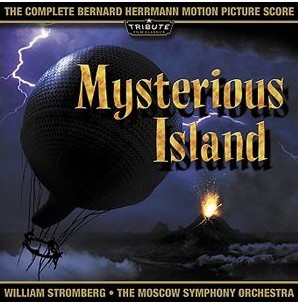 |
As the metallic behemoths fade mercifully into the distance, Martin Sloan begins a sacred journey...a miraculous quest to rediscover and recapture his own singular humanity, yet he remains a stranger in a strange land, a man without a country. Without entirely realizing the course of his escape, Sloan finds himself deep in the country...a mere five miles from the small town in which he grew up as a boy...walking distance. On a fragile pilgrimage, he is disenfranchised…homeless…a lonely refugee searching longingly for his roots, for the simplicity and innocense of childhood. The town is as he left it, unchanged…as though, he thinks, "I had just left yesterday."
In the sad emptiness caressing his heart, Martin finds redemption. Twenty five years have evaporated through a merciful portal in time and space, and Martin has come home.
|
He sees himself as a little boy, unspoiled by experience, innocent and naïve.
His dreams are as sweet and expansive as the infinite universe, for he is as yet a child. Martin finds his parents, alive and vital, blithely raising a family in the rapturous purity of 1934 small town America. His heart aches to find rest and retreat from the brutality of his own world, and remain with his family forever…but it simply cannot be. There is another Martin Sloan growing through his own boyhood amidst the tender joys of band concerts, and the elusive fragrance of Summer. There is room for just one little boy in this sumptuous plateau, this Lost Horizon where the memory of youth survives and endures. "This is his Summer," his 'pop' tells him. "Don’t make him share it."
Martin Sloan has found his soul, and come of age…but he cannot stay. He must take what lessons he has learned, and face the sobering reality of "Childhood’s End," returning to his own life…to his reimagined maturity. Perhaps he will now somehow be able to change the direction of his life, and find a particle of peace, a fragment of joy, a precious gift of renewal, simplicity, and love. At least...he will try.
Herrmann found inspiration in this haunting teleplay. Like Rod Serling, upon whose autobiographical trail his fiction was based, Bernard Herrmann became lost in the sacred, childlike wonder, and tenderness of youth. His score for this thirty minute television adaptation became one of the loveliest of his career, filled with the gentle apparitions of fragile horizons, lost…then found. His music is heartbreaking in its expressive loneliness, and longing…an unprecedented symphonic rhapsody lost in emotional abandon, finding just a gentle wisp of hope and promise…in The Twilight Zone.
Tribute Film Classics: William Stromberg, John Morgan and Anna Bonn
For many years now, the successful teaming of William Stromberg and John Morgan has provided magic for lovers of film music on records and discs. Their long series of recordings of classic motion picture scores for the Naxos label have been cherished, and coveted by collectors. Among their finest presentations in this distinguished series have been the complete restorations, and recordings of King Kong by the legendary Max Steiner, and the glorious music for John Huston’s production of Moby Dick by French composer, Philip Sainton.
| Now Stromberg, Morgan and their financial “angel,” Anna Bonn, have embarked upon an ambitious new journey by forming their own label, Tribute Film Classics, and recording the music that they have always wanted to preserve for posterity. |
|
Their premiere releases under their own banner are, appropriately enough, Bernard Herrmann’s scores for Mysterious Island, and Fahrenheit 451, coupled with Twilight Zone’s "Walking Distance."
Morgan, together with co-producer and orchestrator Anna Bonn, have meticulously reconstructed these three scores with feverish, loyal intensity, and the results are both brilliant and spectacular.
Of Bernard Herrmann's more bombastic achievements, his scores for Ray Harryhausen and Charles Schneer are among his most influential. Genius, and stop-motion animation pioneer, Ray Harryhausen, found his symphonic vision expressed in the superbly crafted, imaginative, and inspired scores of Bernard Herrmann while, for his part, Herrmann discovered a creative artist whose unbridled imagination would soar as loftily as his own. Indeed, his legendary collaboration with Harryhausen, and the visionary wonders of both sight and sound born of that miraculous association, equalled only his partnership with Hitchcock in sheer grandiosity of composition and artistry.
Mysterious Island
William Stromberg has grown substantially over the years both as a conductor, and a first rate interpreter of recorded motion picture music. Their inspired collaborations have seldom borne fruit as sweet as these premiere recordings for their Tribute Film Classics label. It’s difficult to conceive of a more spectacular recording than Mysterious Island. Morgan’s flawless orchestrations are a revelation, while the performance by Stromberg with the Moscow Symphony Orchestra is nothing short of thrilling. Their exhilarating presentation offers a breath taking symphonic roller coaster ride, superbly capturing the excitement and majesty of Herrmann’s fantasy triumph.
Fahrenheit 451
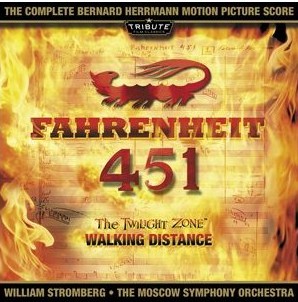 |
For their second release, issued simultaneously, Morgan and Stromberg have chosen one of Herrmann’s most exquisite creations; the wondrous and fertile plateaus of Ray Bradbury’s visionary science fiction fantasy, Fahrenheit 451. Written for this lovely, utopian romance directed by Francois Truffaut, Bradbury’s reflective tale of intellectual retreat paints a totalitarian tableau in which mediocrity is worshipped. Rescuing literary classics from fiery obliteration, a valiant community of rebels yearn in isolation for an idealized Shangri La where free thought and will are cautiously cherished. Herrmann’s ravishing score is among his most sensitive, beautifully realized and expressed in this wonderfully definitve recording in which Herrmann articulated, perhaps, his most haunting and eloquent “Finale.” |
"Walking Distance"
Sharing this wondrous, poetic, palette is the fragile, ethereal elegy written for Rod Serling’s “Walking Distance,” the heart breaking, autobiographical jewel in Twilight Zone’s fantasy crown. Bernard Herrmann’s deeply passionate tone poem echoes a lonely specter, and remembrance of innocence, laid waste by the ravages of time and maturity. Morgan and Stromberg have paid eloquent “Tribute” to this unforgettable work in a premiere release as memorable as its inspiration.
Out from beneath the veil of magician’s illusion comes an additional surprise, quite literally exploding from Santa’s hidden stocking stuffer. If Tribute Film Classics is a label in its commercial infancy, then Varese Sarabande is undoubtedly the first, and original music label initially devoted, and dedicated to the cause of motion picture music.
Venerable producer Robert Townson, and Bernard Herrmann specialist Joel McNeely, have conspired to bring one of Herrmann’s most joyous achievements to prominence once more with their stunning release of the score for Alfred Hitchcock’s North By Northwest.”
North By Northwest
Recorded in its entirety, this new edition of the classic Hitchcock-Herrmann collaboration (it had been recorded previously for the label by composer-conductor Laurie Johnson) is a stunning, definitive interpretation of this mesmerizing work. Conducted by McNeely in, perhaps, his most perfect reproduction of a Herrmann score, North By Northwest is, at once, among the most satisfying recordings in the long, honored tradition of Varese, and its importance to motion picture music.
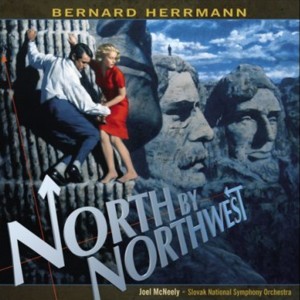 |
Brilliantly reconstructed by Christopher Husted, and wondrously realized by the Slovak National Symphony Orchestra, North By Northwest is a sonic triumph on every level. Townson and McNeely have burst from the gate, racing joyously along side their newest competitors, to finish in an artistic dead heat with Morgan and Stromberg, all of which constitutes a spectacular trilogy devoted to the magic and memory of Bernard Herrmann’s frenzied genius. With James Fitzpatrick’s passionate reconstruction, several months ago, of Miklos Rozsa’s score for The Private Life of Sherlock Holmes on Tadlow Records, these new recordings by Morgan, Stromberg, Townson and McNeely, represent the noblest “Tributes” to classic, symphonic film scoring of this, or any other year. |
Steve Vertlieb
|


